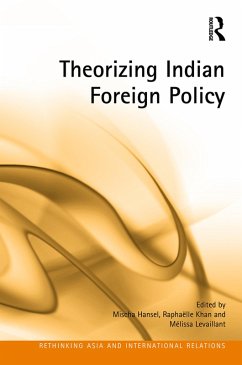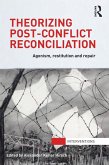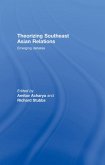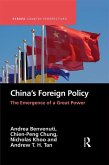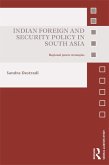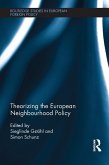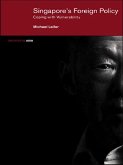Theorizing Indian Foreign Policy (eBook, PDF)
Redaktion: Hansel, Mischa; Levaillant, Mélissa; Khan, Raphaëlle
43,95 €
43,95 €
inkl. MwSt.
Sofort per Download lieferbar

22 °P sammeln
43,95 €
Als Download kaufen

43,95 €
inkl. MwSt.
Sofort per Download lieferbar

22 °P sammeln
Jetzt verschenken
Alle Infos zum eBook verschenken
43,95 €
inkl. MwSt.
Sofort per Download lieferbar
Alle Infos zum eBook verschenken

22 °P sammeln
Theorizing Indian Foreign Policy (eBook, PDF)
Redaktion: Hansel, Mischa; Levaillant, Mélissa; Khan, Raphaëlle
- Format: PDF
- Merkliste
- Auf die Merkliste
- Bewerten Bewerten
- Teilen
- Produkt teilen
- Produkterinnerung
- Produkterinnerung

Bitte loggen Sie sich zunächst in Ihr Kundenkonto ein oder registrieren Sie sich bei
bücher.de, um das eBook-Abo tolino select nutzen zu können.
Hier können Sie sich einloggen
Hier können Sie sich einloggen
Sie sind bereits eingeloggt. Klicken Sie auf 2. tolino select Abo, um fortzufahren.

Bitte loggen Sie sich zunächst in Ihr Kundenkonto ein oder registrieren Sie sich bei bücher.de, um das eBook-Abo tolino select nutzen zu können.
This study deals with Indian foreign policy issues, and asks questions about what is unique of Indian foreign policy and how to study it.
- Geräte: PC
- mit Kopierschutz
- eBook Hilfe
- Größe: 2.66MB
Andere Kunden interessierten sich auch für
![Theorizing Post-Conflict Reconciliation (eBook, PDF) Theorizing Post-Conflict Reconciliation (eBook, PDF)]() Theorizing Post-Conflict Reconciliation (eBook, PDF)64,95 €
Theorizing Post-Conflict Reconciliation (eBook, PDF)64,95 €![Theorizing Southeast Asian Relations (eBook, PDF) Theorizing Southeast Asian Relations (eBook, PDF)]() Theorizing Southeast Asian Relations (eBook, PDF)47,95 €
Theorizing Southeast Asian Relations (eBook, PDF)47,95 €![China's Foreign Policy (eBook, PDF) China's Foreign Policy (eBook, PDF)]() Andrea BenvenutiChina's Foreign Policy (eBook, PDF)41,95 €
Andrea BenvenutiChina's Foreign Policy (eBook, PDF)41,95 €![Indian Foreign and Security Policy in South Asia (eBook, PDF) Indian Foreign and Security Policy in South Asia (eBook, PDF)]() Sandra DestradiIndian Foreign and Security Policy in South Asia (eBook, PDF)31,95 €
Sandra DestradiIndian Foreign and Security Policy in South Asia (eBook, PDF)31,95 €![Theorizing the European Neighbourhood Policy (eBook, PDF) Theorizing the European Neighbourhood Policy (eBook, PDF)]() Theorizing the European Neighbourhood Policy (eBook, PDF)46,95 €
Theorizing the European Neighbourhood Policy (eBook, PDF)46,95 €![Theorizing European Integration (eBook, PDF) Theorizing European Integration (eBook, PDF)]() Dimitris N. ChryssochoouTheorizing European Integration (eBook, PDF)48,95 €
Dimitris N. ChryssochoouTheorizing European Integration (eBook, PDF)48,95 €![Singapore's Foreign Policy (eBook, PDF) Singapore's Foreign Policy (eBook, PDF)]() Michael LeiferSingapore's Foreign Policy (eBook, PDF)64,95 €
Michael LeiferSingapore's Foreign Policy (eBook, PDF)64,95 €-
-
-
This study deals with Indian foreign policy issues, and asks questions about what is unique of Indian foreign policy and how to study it.
Dieser Download kann aus rechtlichen Gründen nur mit Rechnungsadresse in A, B, BG, CY, CZ, D, DK, EW, E, FIN, F, GR, HR, H, IRL, I, LT, L, LR, M, NL, PL, P, R, S, SLO, SK ausgeliefert werden.
Produktdetails
- Produktdetails
- Verlag: Taylor & Francis eBooks
- Seitenzahl: 236
- Erscheinungstermin: 21. April 2017
- Englisch
- ISBN-13: 9781317010906
- Artikelnr.: 48210472
- Verlag: Taylor & Francis eBooks
- Seitenzahl: 236
- Erscheinungstermin: 21. April 2017
- Englisch
- ISBN-13: 9781317010906
- Artikelnr.: 48210472
- Herstellerkennzeichnung Die Herstellerinformationen sind derzeit nicht verfügbar.
Mischa Hansel is an Assistant Professor (Wissenschaftlicher Mitarbeiter) at the RWTH Aachen University. Previously he worked at the Justus Liebig University Giessen and the University of Cologne where he obtained his Ph.D in 2012. Several of his works deal with the question of whether or not liberal and constructivist FPA approaches are suitable to the study of Indian foreign policy. Recent articles appeared in Global Change, Peace & Security and Asian Politics and Policy respectively. Other research interests include the norms and discourses guiding decisions on military interventions, Western and Non-western military transformation processes, arms control regimes, and German foreign policy. Raphaëlle Khan is a PhD candidate in History/International Politics at King's College London. Her work focuses on India's emergence as an international sovereign actor between the 1920s and the 1960s, through an analysis of Indian understandings of sovereignty. She holds a double Master's Degree in European Studies from the London School of Economics and Political Science (LSE) and the Institut d'Etudes Politiques de Paris (Sciences Po). Her research interests include India's diplomacy in multilateral arenas, International Organisations, International Politics of South Asia, Rising Powers, and Europe-India relations. Mélissa Levaillant is a Researcher at the Institute of Strategic Research (IRSEM) of the French Ministry of Defence. She obtained her PhD from Science Po Paris in 2016, where she teaches World Politics and South Asian Security. Her dissertation was on the institutionalisation of India's ministry of External Affairs, from 1947 to 2015. Her other main research interests include India's foreign policy towards the Middle East and security issues in the Indian Ocean. In 2012, she published a book on India's foreign policy towards Iran.
Chapter 1. Historiography of South Asia's International Relations.
Chapter 2. International Relations and Foreign Policy in India:
Policy-oriented Works between Discipline and State.
Chapter 3. More than a Rule Taker: The India Way of Multilateralism.
Chapter 4. India as a Norm Claimer: Normative Struggles and the Assertion
of Sovereignty at the San Francisco Conference (1945)
Chapter 5. Theorizing Indian Strategic Culture(s): Taking Stock of a
Controversial Debate.
Chapter 6. In Modi's Might? Maintenance Processes and Prospects for
De-escalation in the India-Pakistan Rivalry, 1997-2015
Chapter 7. India and Liberal IR Theory: What Role for Public Opinion?
Chapter 8. The Contribution of Neo-institutionalism to the Analysis of
India's Diplomacy in the Making.
Chapter 9. India's Taliban Dilemma: To Contain or to Engage?
Chapter 10 Inside Out? Assessing the Domestic Determinants of India's
External Behavior
Chapter 2. International Relations and Foreign Policy in India:
Policy-oriented Works between Discipline and State.
Chapter 3. More than a Rule Taker: The India Way of Multilateralism.
Chapter 4. India as a Norm Claimer: Normative Struggles and the Assertion
of Sovereignty at the San Francisco Conference (1945)
Chapter 5. Theorizing Indian Strategic Culture(s): Taking Stock of a
Controversial Debate.
Chapter 6. In Modi's Might? Maintenance Processes and Prospects for
De-escalation in the India-Pakistan Rivalry, 1997-2015
Chapter 7. India and Liberal IR Theory: What Role for Public Opinion?
Chapter 8. The Contribution of Neo-institutionalism to the Analysis of
India's Diplomacy in the Making.
Chapter 9. India's Taliban Dilemma: To Contain or to Engage?
Chapter 10 Inside Out? Assessing the Domestic Determinants of India's
External Behavior
Chapter 1. Historiography of South Asia's International Relations.
Chapter 2. International Relations and Foreign Policy in India:
Policy-oriented Works between Discipline and State.
Chapter 3. More than a Rule Taker: The India Way of Multilateralism.
Chapter 4. India as a Norm Claimer: Normative Struggles and the Assertion
of Sovereignty at the San Francisco Conference (1945)
Chapter 5. Theorizing Indian Strategic Culture(s): Taking Stock of a
Controversial Debate.
Chapter 6. In Modi's Might? Maintenance Processes and Prospects for
De-escalation in the India-Pakistan Rivalry, 1997-2015
Chapter 7. India and Liberal IR Theory: What Role for Public Opinion?
Chapter 8. The Contribution of Neo-institutionalism to the Analysis of
India's Diplomacy in the Making.
Chapter 9. India's Taliban Dilemma: To Contain or to Engage?
Chapter 10 Inside Out? Assessing the Domestic Determinants of India's
External Behavior
Chapter 2. International Relations and Foreign Policy in India:
Policy-oriented Works between Discipline and State.
Chapter 3. More than a Rule Taker: The India Way of Multilateralism.
Chapter 4. India as a Norm Claimer: Normative Struggles and the Assertion
of Sovereignty at the San Francisco Conference (1945)
Chapter 5. Theorizing Indian Strategic Culture(s): Taking Stock of a
Controversial Debate.
Chapter 6. In Modi's Might? Maintenance Processes and Prospects for
De-escalation in the India-Pakistan Rivalry, 1997-2015
Chapter 7. India and Liberal IR Theory: What Role for Public Opinion?
Chapter 8. The Contribution of Neo-institutionalism to the Analysis of
India's Diplomacy in the Making.
Chapter 9. India's Taliban Dilemma: To Contain or to Engage?
Chapter 10 Inside Out? Assessing the Domestic Determinants of India's
External Behavior
